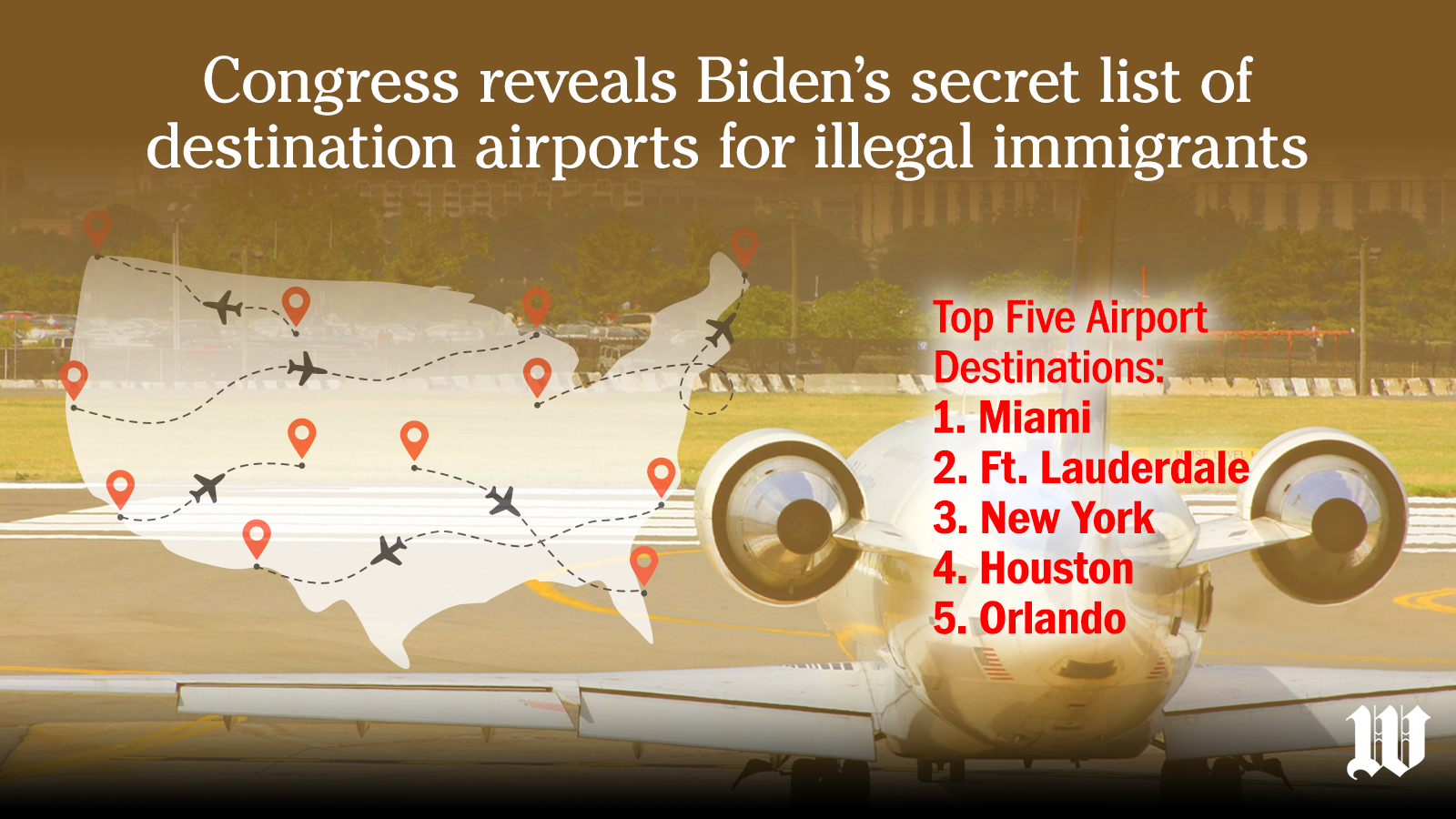Southern Florida is by far the top destination for unauthorized migrants coming to the U.S. under one of the Biden administration’s special “parole” programs, according to data that House Republicans pried loose from the Department of Homeland Security.
The program allows would-be migrants from Cuba, Haiti, Nicaragua and Venezuela to skip over the border and fly directly into American communities. The migrants are in the U.S. without the law’s authorization but entered “lawfully” because they were given parole.
Of the roughly 200,000 who arrived from January through August last year, three-fourths headed to the Miami or Fort Lauderdale airports.
New York was the third top destination, and Houston was fourth. Another Florida location, Orlando, rounded out the top five.
The list had been a guarded secret, but the House Homeland Security Committee pried it loose at the point of a subpoena.
“These documents expose the egregious lengths Secretary [Alejandro] Mayorkas will go to ensure inadmissible aliens reach every corner of the country, from Orlando and Atlanta to Las Vegas and San Francisco,” said Rep. Mark Green of Tennessee, chairman of the committee.
SEE ALSO: Biden could welcome Palestinians with refugee program, inside track on U.S. citizenship

Airports in the Washington region combined for 11th place on the list with 1,472 migrant arrivals during the first eight months of the program.
All told, more than 50 destinations were on the list. Dublin, Ireland, recorded a couple of migrant arrivals, and Canadian airports were listed as destinations for more than 60 migrants.
Mr. Green said the Biden administration has acknowledged that those arriving under the program are “inadmissible,” meaning they normally would be considered illegal immigrants.
The destinations were the first locations where the migrants arrived. Homeland Security said taxpayers aren’t paying directly for the flights.
“These processes are part of the administration’s strategy to combine expanded lawful pathways with stronger consequences to reduce irregular migration, and have kept hundreds of thousands of people from migrating irregularly,” the department said in a statement.
Noting that the criteria for migrants had been made public, the department challenged descriptions of the program as “secret.”
The department had batted back requests for the list of arrival locations. In response to a Freedom of Information Act request from the Center for Immigration Studies, the department said the list of airports “would reveal information about the relative number of individuals arriving, and thus resources expended at particular airports which would, either standing alone or combined with other information, reveal operational vulnerabilities that could be exploited by bad actors altering their patterns of conduct, adopting new methods of operation, and taking other countermeasures, thereby undermining CBP’s law enforcement efforts to secure the United States borders.”
The department also rebuffed attempts to learn the international departure airports of the migrants, again blaming potential damage from “bad actors.”
Mr. Mayorkas created the parole program for Venezuela in October 2022 and expanded it to the other nations in January 2023. It has become known as the CHNV program.
His department was facing a crush of people from those nations jumping the U.S.-Mexico border. Mr. Mayorkas figured he could persuade them to skip the border and ease the chaos if he allowed them to fly directly to American communities.
Roughly 400,000 migrants have taken advantage of the program since the first Venezuelans arrived.
Venezuelans account for about 31% of approvals. Cuban and Haitian migrants each represent about 25%, and Nicaraguans comprise the rest.
The arrivals are supposed to prove that they have a financial supporter and won’t depend on government assistance. Still, The Washington Times has reported that people are selling those financial certifications for $5,000 in Central America, and some high-profile cases show parolees living in government-run shelters.
The department says the program is discretionary and an officer can deny parole. The approval rate, though, is 95% or higher.
Parole lasts two years, though Mr. Mayorkas has shown an inclination to allow migrants to apply to renew their status.
The CHNV program allows migrants to obtain work permits or put down other roots and gain some taxpayer benefits, making it difficult for a future administration with a stricter enforcement approach to deport them.
Homeland Security says those involved have “arrived lawfully.”
Mr. Green said the program violates the law, which reserves parole for rare instances for a “significant” public benefit to the U.S. or an “urgent” humanitarian reason.
“Secretary Mayorkas’ CHNV parole program is an unlawful sleight of hand used to hide the worsening border crisis from the American people,” Mr. Green said.
The House committee said 1.6 million foreign nationals were awaiting approval for the program as of October. Mr. Mayorkas capped arrivals at 30,000 a month.
Parole programs have also been arranged through a special program for Ukrainians and a program for migrants who arrive at the southern border and preschedule their arrivals without a need for visas.
Given the nationalities involved, it’s unsurprising that southern Florida would be the most popular destination, but the burden on the state and the Miami-area community affects other things, such as schools and airport wait times.
Miami International Airport faced six-hour wait times last week for arriving international passengers to clear customs.
Emilio Gonzalez, who ran U.S. Citizenship and Immigration Services in the Bush administration and later served as CEO of the Miami airport, said the parole program arrivals contribute significantly to the problem.
“These guys are arriving with minimal documentation, which causes [Customs and Border Protection] to spend more time screening and interviewing them,” Mr. Gonzalez said.
• Stephen Dinan can be reached at sdinan@washingtontimes.com.




Please read our comment policy before commenting.